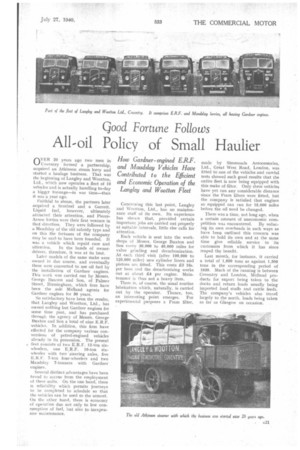good Fortune Follows
Page 23

If you've noticed an error in this article please click here to report it so we can fix it.
All-oil Policy of Small Haulier
How Gardner-erzgined E.R.F. and Maudslay Vehicles Have Contributed to the Efficient and Economic Operation of the Langley and Wootton Fleet
OVE,TR 20 years ago two men in Coventry formed a partnership, acquired an Atkinson steam lorry and started a haulage business. That was the beginning of Langley and Wootton, Ltd., which now operates a fleet of 10 vehicles and is actually handling to-day a bigger tonnage—in war time—than it was a year ago.
Faithful to steam, the partners later acquired a Sentinel and a Garrett. Liquid fuel, however, ultimately attracted their attention, and PierceArrow lorries were their first venture in that direction. They were followed by
Maudslay of the old subsidy type and on this the fortunes of the company may be said, to have been founded. It was a vehicle which repaid care and attention. In the hands of ownerdrivers, therefore, it was at its best.
Later models of the same make were owned in due course, and eventually these were converted to use oil fuel by the installation of Gardner engines. This work was carried out by Messrs. George Buxton and Son, of Palmer Street, Birmingham, which firm have been the sole Midland agents for Gardner engines for 30 years.
So satisfactory have been the results, that Langley and Wootton, Ltd., has owned nothing but Gardner engines for some time past, and has purchased through the agency of Messrs. George Buxton and Son a total of nine E.R.F. vehicles. In addition, this firm have effected for the company various conversions of petrol-engined vehicles already in its possession. The present fleet consists of two E.R.F. 12-ton sixwheelers, one E.R.F. 10-ton sixwheeler with two -steering axles, five E.R.F. 7-ton four-wheelers and two Maudslay 7-tonners with Gardner engines.
Several distinct advantages have been foend to accrue from the employment of these units. On the one hand, there is reliability which permits journeys to he completed to schedule so that the vehicles can be used to the utmost. On the other hand, there is economy of operation due not only to low consumption of fuel, but also to• inexpeasive maintenance. Concerning this last point, Langley and 'Wootton, Ltd., has no maintenance staff of its own., Its experience has shown that, provided certain important jobs are carried out properly at suitable intervals, little else calls for attention.
Each vehicle is sent into the workshops of Messrs. George Buxton and Son every 30,000 to 40,000 miles for valve grinding and decarbonization. At each third visit (after 100,000 to 120,000 miles) new cylinder liners and pistons are fitted. This costs £3 16s. per bore and the decarbonizing works Out at about £4 per engine. Maintenance is thus not a heavy item.
There is, of course, the usual routine lubrication which, naturally, is carried out by the operator. Thence, too, an interesting point emerges. For experimental purposes a Fram filter,
made by Simmonds Aerocessories, Ltd., Great West Road, London, was fitted to one of the vehicles and careful tests showed such good results that the entire fleet is now being equipped with this make of filter. Only three vehicles have yet run any considerable distance since the Fram filters were fitted, but the company is satisfied that engines so equipped can run for 15,000 miles before the oil need be changed.
There was a time, not long ago, when a certain amount of uneconomic competition was encountered. By reducing its own overheads in such ways as have beep outlined this concern was able to hold its own and at the same time give reliable service to its customers from which it has since reaped the benefit.
Last month, for instance, it carried a total of 1,690 tons as against 1,300 tons in the corresponding period of 1999. Much of the running is between Coventry and London, Midland products for export being taken to the docks and return loads usually being imported food stuffs and cattle feeds. The company's vehicles also travel largely to the north, loads being taken as far as Glasgow on occasion.




















































